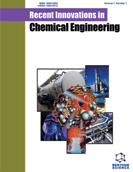Abstract
Background: Recently, two-phase flow solvent extraction has been emerged as a promising method for the extraction of radionuclides because it enables minimized radiation exposure and little waste emission. In the field, the coupling of microfluidics-based solvent extraction and stripping with ICP-MS is expected because the combination enables highly sensitive and selective analysis. The previous works have successfully coupled only a single microchip with ICP-MS, leading to lack of selectivity and the need for handling radioactive materials during batch extraction. The study reports for the first time the successful coupling of combined extraction, stripping microchips with ICP-MS.
Methods: Extraction of rhenium in 0.1 M HNO3 with Aliquat-336® and stripping of the resulting solvent by 8 M HNO3 were performed on Y-Y shaped microchannel chips. The condition for extraction and stripping in batches and on separate chips were characterized. Then two microchips were connected for extraction and back extraction in series. An external coiled tube (0.1 mm dia., 1 m long) was used to stabilize the pressure. As a result, two-phase flow could be maintained in both the microchips. Additionally, an interface system including a switching valve and a make-up flow was developed for coupling the solvent extraction chip with ICP-MS. The on-line measurement of Re after extraction and stripping was characterized.
Results: The condition for extraction and stripping by combined microfluidic chips was found. The two-phase flow could be maintained for hour. The calibration curve of Re was obtained in the 1–20 µg/L range. The detection limit was 0.2 µg/L with a required sample volume of 1 mL. Total process time including extraction, back-extraction, and measurement was less than 1 h. The total efficiency using the combined microsystems was greater than 60%, while the total efficiency of separate extraction and back-extraction on microchips being about 40%. The interference is avoidable with the proposed combined system under the tested conditions.
Conclusion: We successfully coupled combined microchips for extraction and stripping with ICP-MS. The two-phase flow can be formed and maintained for a long time through pressure balance by an external flow resistance (we used a coil tube in the study). The developed system promises a highly sensitive and selective elemental analysis with little direct treatment of samples, and thus it is possible to be applied in the field of radiochemical analysis.
Keywords: Two-phase microflow, solvent extraction, ICP-MS, sequential analysis, elemental analysis, rhenium.
Graphical Abstract


















